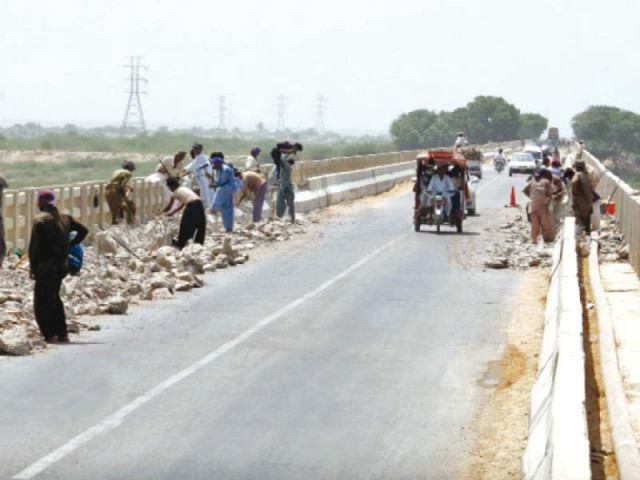Restricted entry: It takes Rs3,000 to cross rickety Thatta-Sujawal bridge
The bridge is the last one on River Indus that connects over 20 cities to each other

The last repairs on the Thatta-Sujawal bridge were carried out last year. PHOTO: FILE
When a heavy truck loaded with goods tries to cross the rickety Thatta-Sujawal Bridge, the police tell the driver to turn back. The bridge is not strong enough to withstand the load. If the driver offers to pay Rs3,000, the barriers are lifted for him to carry on.
The police of both Thatta and Sujawal districts, who are deployed on both ends, allow loaded vehicles to use the bridge at night but they charge heavy fees, said an official privy to the matter. “They [police] charge according to the weight of a vehicle,” said a container driver, Wali Dad. The charges are a minimum of Rs3,000 and can go up to Rs15,000 depending on the weight that truck is carrying.

The one-kilometre-long bridge, which was built at a cost of Rs40 million in 1967, is 24 feet wide and comprises 13 spans. It was repaired last year after which lighter vehicles were allowed to use it.
This historical bridge has become very weak and engineers have warned the district administration that it can collapse at any time if loaded vehicles continue to ply. But a little ‘chai pani’ solves all their problems.
“No one is allowed to cross the bridge if they are carrying more than 15 tons,” said the chief engineer of the Sindh Coal Authority, Hassan Ali Memon. “It is a national asset and we have to protect it,” he added. Memon feared the bridge will collapse if heavy-loaded trucks are allowed to use it.
Read: Fading leverage: Transitioning off as a transit hub
The Thatta-Sujawal Bridge is the last one on River Indus that connects over 20 cities to each other, including Thatta, Sujawal, Mirpur Bathoro, Darro, Jati, Shaheed Fazil Rahu, Badin, Tando Bago, Jhudoo, Talhar, Gharo, Gujjo and other cities of four districts.
Before the repairs were carried out last year, consultants and engineers informed the Sindh government that the bridge will not be able to survive too many years. Hence, Sindh Chief Minister Syed Qaim Ali Shah sanctioned funds in the budget for a new bridge, which is currently under construction. “It’ll take at least 15 months [for the new bridge] to be completed,” said Memon.
Until the new bridge is open for traffic, the local police are minting as much money as possible. When a truck approaches the barrier, the police tell the driver that it is closed for heavy traffic. “If you pay, the bridge becomes ‘stronger’ all of a sudden and you are allowed to pass easily,” pointed out a transporter, Yousuf Raza.
“We have complained to the police and the local administration,” said a local transporter, Babo Soomro, who pays minimum Rs3,000 for each vehicle coming from Karachi to Badin or vice versa. “They [police] allow only those drivers to pass who pay,” he added.
The district administration is fully aware of the situation but have yet to spring into action. “It is he mutual responsibility of Thatta and Sujawal administrations,” said Sujawal’s additional deputy commissioner Syed Attaullah Shah, admitting that he has received complaints that heavy traffic is being allowed on the bridge.
Read: Transport trouble: With age limit of buses, owners fear demise of fleet
Thousands of people in the area will face problems if bridge is closed, he said, adding that they have built stoppers to indicate that heavy traffic isn’t allowed.
Some high-ranking police officials are aware of the issue and some policemen have been suspended after complaints. “The business continues despite complaints from the people,” said an official.
When asked about this roaring trade on the bridge, Thatta SSP Pir Farid Jand could only laugh. “I’ll ask the police not to take bribes now,” he said, promising to look into the matter.
Published in The Express Tribune, July 17th, 2015.


















COMMENTS
Comments are moderated and generally will be posted if they are on-topic and not abusive.
For more information, please see our Comments FAQ